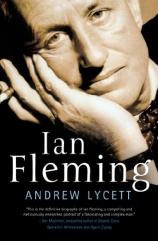Ian Fleming
Review
Ian Fleming
This new and surely exhaustive biography of the fascinating creator of the James Bond series reveals a deep, sensuous, driven man who lived through the end of Britain’s orderly days of world empire and into a modern era that was by contrast morally chaotic and numb.
Andrew Lycett, who has written about varied other luminaries of Fleming’s ilk (Rudyard Kipling, Dylan Thomas) --- brilliant, well educated, moneyed --- has pulled out all the stops here to ensure that his Fleming is the Fleming. A neglected boy, as those of his class often were, troubled teen Fleming jumped ahead as a scholar when sent to a “cramming” school, and, casting about for a career, failing as a banker, he was lucky enough to find himself suited for war at a time when a suitable war was breaking out. He worked in the British Naval Intelligence during World War II, at which point, legend has it, James Bond was born.
"This new and surely exhaustive biography of the fascinating creator of the James Bond series reveals a deep, sensuous, driven man who lived through the end of Britain’s orderly days of world empire and into a modern era that was by contrast morally chaotic and numb."
But Bond did not see the light of public scrutiny until a few years after the war. Lycett records that Fleming began typing away at this story, “which had been rattling around in his head for so long” while vacationing in Jamaica with his bride-to-be, Anne Charteris, a divorcee and the great love of his not-always-so-happy life. He managed to complete the novel in just four weeks, and “when Ian returned to London, not only was he a married man, but also he carried a typescript of CASINO ROYALE in his suitcase.”
For the next 13 years, Fleming turned out Bond books to satisfy an ever-increasing popular demand. Perhaps the stories reminded readers of the good old days when men were well dressed and deadly, women were submissive and seductive, and enemies were villainous and worth destroying, like the evil Goldfinger. Or perhaps they were simply thrilled with the new techno-toys in the complex age of stealthy, cold warfare. Undoubtedly, the Bond books gave the spy vs. spy genre a huge boost that has never since waned, and put into the language certain deathless catchphrases like “shaken, not stirred.”
Fleming’s fictional women (and some real ones) fell into bed with lubricious abandon, his bad guys cheated at cards, and there were few good guys; Bond himself was, like his creator, a roué. Not unlike Fleming, who, as depicted by Lycett, was not much for personal awareness: he didn’t see his relationship with Anne crumbling, or acknowledge it, until it was nearly ground to powder. Yet his understanding of the tactics of spycraft were such that his even sardonic suggestions to the Kennedy entourage at a casual breakfast, based on his upcoming novel THUNDERBALL, were taken seriously as possible tactics in the American standoff with Fidel Castro.
This is a long book, possibly too long for any but the hardiest Fleming fan, but Lycett seeks to make Fleming a three-dimensional man, not to be mistaken for the one-dimensional character he created. Lycett concludes fairly that Fleming “encapsulates both the tragedy and the triumph of his time,” beginning by cleaving to the straight and narrow respectability of his forebears, and ending with a flash of thoroughly modern madcap creativity that lined some pockets nicely and brought us all a bit of a thrill.
Reviewed by Barbara Bamberger Scott on October 11, 2013
Ian Fleming
- Publication Date: October 1, 2013
- Genres: Biography, Nonfiction
- Hardcover: 496 pages
- Publisher: St. Martin's Press
- ISBN-10: 1250037980
- ISBN-13: 9781250037985





